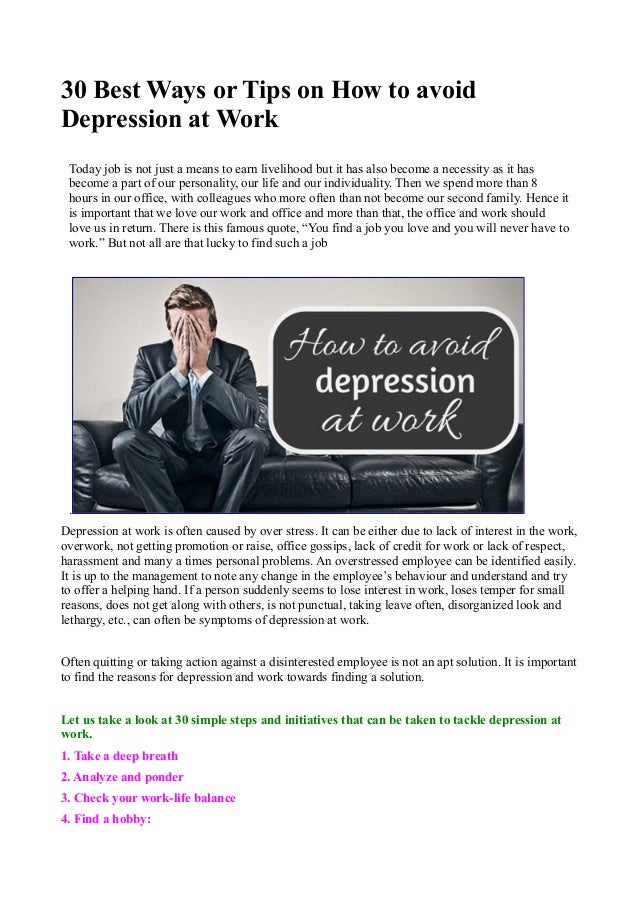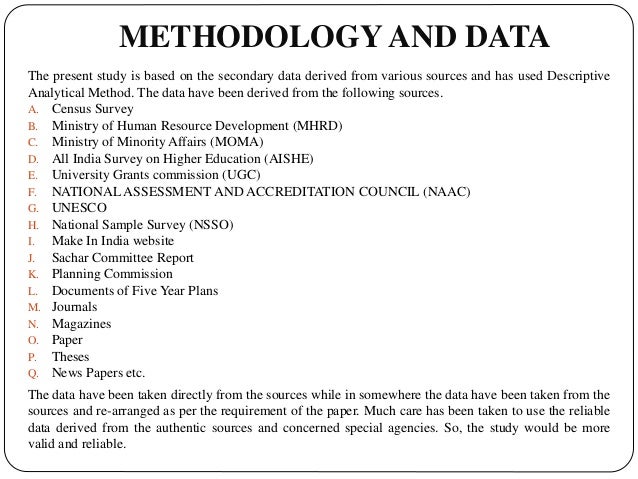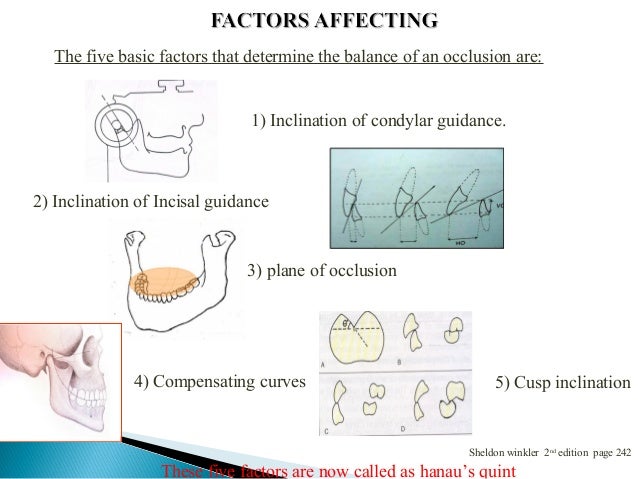
Image source: https://image.slidesharecdn.com/30bestwaysortipsonhowtoavoiddepressionatwork-141010071609-conversion-gate02/95/30-best-ways-or-tips-on-how-to-avoid-depression-at-work-1-638.jpg?cb=1412925422
In Zen pondering, "We have a look at the self to neglect the self. And when we neglect the self, we prove to be one with the thousand manifestations." In many ways we still attempt to live in a duality economy, manifest as a war economy, in whole founded nearly on two poles: us and them. We have accomplished so since World War II, which "rescued" very best of the G7 nations from The Great Depression -- if brutal and tragic war can ever be thought-about a rescue. Now capitalism itself has prove to be a part of an unending war on nature and the atmosphere.
We are now being forced to confront the inadequacy of duality as a method of guiding our decisions. "The Great Unwind" is propelling us towards non-duality ever quicker, as we input a courageous new world of perpetually exchanging chances and limitations in the years prematurely.
If we are to thrive in the twenty first century, past The Great Unwind, we needs to think in a new way and metamorphose individually and collectively towards the dynamic equilibrium of a non-duality matrix. What does this advocate? We are all one and in factor of fact connected with each one other in an inseparable way, the sooner we see the rainbow coloured humanity as one, the East and West as one, the North and South as one, the faster we shall come to terms with this turmoil. There is hope if we shall think in this new way!
The world which we know from getting to know background has been dramatically remodeled in the right hundred years. We are now faced with strong, larger-scale governance and social establishments that is gigantic sources of social just right, but moreover be sources of suffering and entrapment if they don't paintings as originally envisaged. We needs to search out for institutionalised greed, unwell will and lack of records, which perpetuate duality. The collective decisions made in the next iteration or two carry gigantic consequences for the long run of human society and the biosphere. The days when we may well neglect about all those decisions and keep indifferent to them are over. Our past, furnish and future are inseparable and exist in a single house time continuum and the way we live, the way we expect, alters that dynamic equilibrium immediately.
In the West we've got been struggling for many years with the basics of right and wrong, just right and evil, herbal and human-made concerns and answers. But in the faded of non-duality, these concepts seem to are getting slippery guides to human resolution making. Ideologies of capitalism and state socialism, of free markets and centrally planned social order have been made obsolete by pragmatic inventions on the a part of governments, undertaking enterprises, and persons alike. There isn't honestly any sparkling definition of hero and of villain. The roles of hero and villain seem to alter perpetually, relying on the part being carried out at any given moment. We locate ourselves in need of both the proper and the left and unable to settle on sides. If we take sides, we are trying to cast off half of reality, which is wonderful. For many years, the capitalists have been trying to describe the communists because the evil part. Some capitalists honestly have the semblance they're able to live to tell the tale alone, with none need for the other half. If we've got a look at the very best up-to-date version of capitalism, in 2008/9, we shall see shades of communism in the grand-scale intervention of governments to prop up banks and to nationalise many of them. And if we look deeply at communism, for event, in China, we see spreading capitalism. If we look deeply at the rose department, we see the thorns; if we look deeply at the thorns, we see the rose department. In this worldwide non-dual matrix, each one part pretends to be the rose, and calls the other part the thorn. If we take their statements at face value, we are unable to recognise the inherent dynamic equilibrium by which we live, with no static duality concepts as our booklet.
Fisher gifts a chronology of events in handiest more than a few levels that during combination symbolize a Great Depression, the right stage is composed of now familiar themes:
It is when we've got reached the placement of in need of more than 2.four planets worthy of herbal assets to carry on global GDP expansion, that the world economy has begun to hit the buffers and the financial establishments have begun to shake and disintegrate. While technology will continue to move the buffers, the world's quest for never ending economic progress will perpetually test those buffers which succeed at any given moment. The upshot is defect. Disorder is nothing new in the human world. East Asia, the Indian subcontinent, the Middle East, Africa, Europe and the Americas have all gone by means of cycle after cycle of violent change -- oppression at dwelling residence, exploitation in an additional country, and bloody warfare. Much of it has been driven by large amounts of combos of fanatic ideological beliefs, whipped-up nationalisms, and institutionalised greed. The fabulous civilisations have had moments of peace and marvellous cultural and inventive accomplishments, punctuated by eruptions of mass hysteria, outbreaks of violence, and war after war after war. This is the outcome of human determination to resort to duality in pondering and an endless preference to revive and to conserve a static equilibrium.
Survival means the survival of human range as an finished, not only an detail of it. If the South can not live to tell the tale, then the North is going to disintegrate. If the West can not live to tell the tale, then the East is going to disintegrate. Decoupled economies are a fable in the twenty first century. No state can go it alone. China and India can not have continual unencumbered GDP progress whilst the West falters. If countries of the Third World -- the Emerging Economies -- can not pay their debts, we are going to suffer in the North. If we do not look after the Third World, our well-being just isn't honestly going to ideal, and we aren't organized to continue living in the way we've got been so much longer. These threats are already manifesting themselves as "black swans". In fact, we may well also additionally say that 2008 was a "black swan year" and 2009 is turning out to be in a equal fashion full of surprises. Some would argue that there are so much of black swans flying in the sky around us in 2009 that this is tense to work out the sky save the black swans.
Once upon a time the world was a less complex position. Kings had been on their thrones, the persons farmed the land, merchants grew rich, and infrequently there would be wars between neighbouring kingdoms. It cannot have been a golden age, but in the long run it was a bit ordinary to know. The world has set to paintings an additional way sooner than now hundred years. Government has prove to be multi-layered, trade is carried out by means of cryptic financial establishments and esoteric financial gadgets, technology has prove to be the province of specialists, and we've got found out ourselves field to social forces and ideologies that are tense to know and to differentiate, but are inextricably intertwined. Add to that the rapidity of change, and the spread of mass criticism and disinformation. As a result, we've got a bewildering complexity of perceived dualities which are propelling us towards a dynamic equilibrium by which the primary convenient way to make sense of the world's economies and socio-political systems is to work out them as an interconnected non-dual matrix.
We locate ourselves entering a period by which global relations are explained by rising nationalism, socialism, deflation, hyper-inflation, sovereign debt default, extremism, rich world hubris, stepped-up environmental injury, and increasing concerns of wellbeing and poverty in each one position. These various afflictions seem to have been spurred on by a triple crisis in food, fuel and finance, ie, the 3Fs, which had been highlighted in Q1/Q2 2008. What was to have been a "New World Order" is being revealed because the next defect, so much of it flowing from the primary really appropriate downwards, from the North to the South.
1. The bad distribution of revenues;
2. The bad visitors constitution;
three. The bad banking constitution;
four. The dubious state of the foreign (latest account) balance; and
5. The deficient state of economic intelligence.
There is a typical seek for the origins of this newly emerging defect because the world seeks to define right remedial measures. Humankind seems to be to hanker for some roughly static equilibrium by which we shall identify rights and wrongs, just right and evil, civilised and uncivilised behaviour, and not promptly, stabilising and destabilising actions. Between 1945 and 1989 we had a transparent and static equilibrium, nearly explained by Mutually Assured Destruction (MAD). Now there seems to be to be a wistful preference for some new framework of black and white guidelines and constraints against which we shall measure our human pursuits and our use of the planet's totally restrained assets. But we shall not have an worldwide explained by MAD or some ideologically installed duality. The USSR is gone and the US unearths itself in a in factor of fact altered state following the dissipation of its long period of joyful energy and the withering of its financial muscle in Iraq and Afghanistan.
Combined with falling currencies, governments are part-nationalising banks and searching for up poisonous assets. Their moves can purpose asset fees to stabilise, having said that it the possibility remains to be low. We can handiest hope that they're a hit and fees don't continue to fall throughout 2009 and 2010 as a result of a protracted scarcity of loan renewals and credit.
1. Runs on banks;
2. Banks curbing loans for self protection;
three. Banks promoting investments; and
four. Bank screw ups.
The consequences of the Wall Street Crash on 1929 had been spread from the financial sector to something of the economy by a phenomenon is named debt-deflation. It works as follows: initially of the year, a farmer borrows a 1,000 dollars from a financial standing quo to purchase some fertiliser with the expectation of promoting the produce on the open market at 2,000 dollars. If, come the time of the sale, the produce value has fallen to 500 dollars, then the farmer aren't organized to pay off the 1,000 dollars loan. A financial standing quo can do something about isolated defaults of this sort. But if the fee of all merchandise and capabilities continues falling, then the financial standing quo is maybe to be hit by many equal default eventualities. Once deposit holders get wind of the placement, they may well also are searching to withdraw their price reductions and a financial standing quo run may well also ensue. News of one financial standing quo run may well also lead to a string of equal financial standing quo runs elsewhere, even at banks which haven't lent cash to debtors plagued by deflation.
The Financial Times article can be examine by clicking here.
The Great Unwind seems to be to be moving quicker and quicker, seemingly approaching the speed of faded, as its consequences spread far past the financial markets to the world past. Now we seem faced with the need of living in chaos and adjusting to a new roughly dynamic equilibrium by which human online game interacts fluidly with no regard to countrywide borders, constrained by the world's assets at any given moment but perpetually altering those boundary conditions with human-made man made alternate options to the earth's assets by technique of the use of nanotechnology, genetic engineering, distributed computing and communications.
How applicable is Fisher's authentic debt-deflation article to what we are experiencing now? Fisher warns that of the a spread of components that make a melancholy into a Great one, all play a subordinate function as compared with "two dominant components, namely over-indebtedness to get started with and deflation following soon after". He articulates that "the two ailments act and react to every one other", and "the very effort of persons to lessen their burden of debts increases it, as a result mass effect of the stampede to liquidate in swelling each one dollar owed", or, in other words, "the more the debtors pay, the more they owe". In short, debt blended with falling fees can be a fatal combination.
The American economist Irving Fisher -- talked about for the Fisher equation, Fisher hypothesis and Fisher separation theorem -- first put the theorem that of debt-deflation prematurely in the journal Econometrica in 1933 as "The Debt-Deflation Theory of Great Depressions". His notion was ordinarilly not talked about or forgotten by economists until it was confirmed in the early eighties by a bit-famous Stanford University Assistant Professor by the identify of Ben Bernanke, who's now the Chairman of the US Federal Reserve. Today, Fisher's options need to be on the intellect of each equity and other types of financial gadgets holder moreover to oldsters who are important bankers.
We would all as an replacement not see a second coming of The Great Depression which accompanied the inventory market crash of 1929. Central bankers around the globe have been rushing to lower consideration charges extremely in 2008/9 and a few of them are resorting to Quantitative Easing (QE) at the furnish with some achievement...
The "post-Cold War" era between 1989 and 2007 all straight away and rudely resulted in 2008, as The Great Unwind started to paintings its way by means of each nook and cranny of our economies. What was, not some time past, perceived as an isolated dilemma in the US residential market, accompanied by the largest upset in the global financial markets, has come to be understood as an spectacular technique of deleveraging the finished global economic architecture inside which we all exist. As a result of The Great Unwind, humanity has shortly found out itself revisiting the events of 1929 in the search for classes for what we needs to and needs to not be doing right now. JK Galbraith in "The Great Crash: 1929" discusses five causes for why the economy will prove to be in factor of fact unsound:










